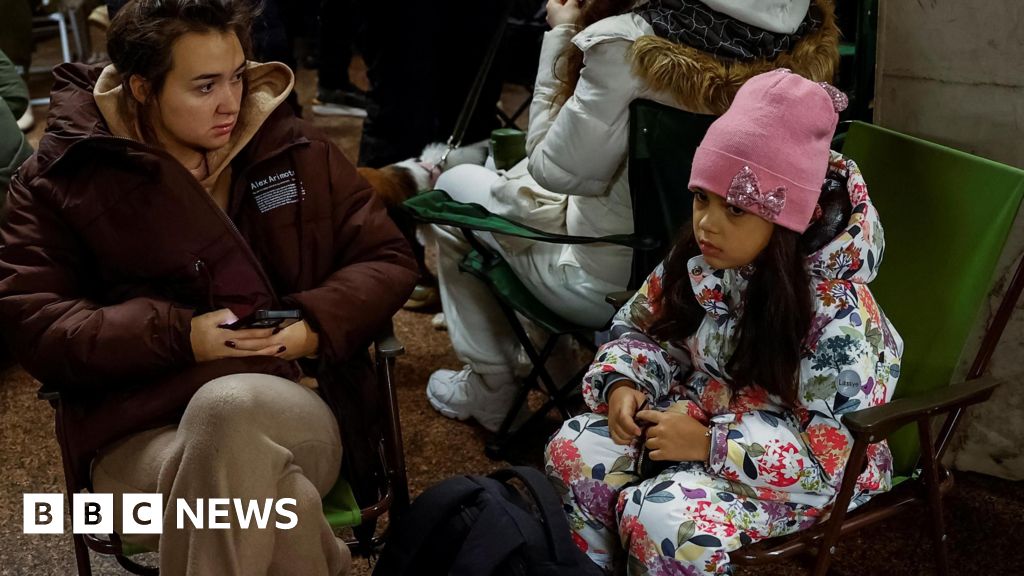ARTICLE AD BOX
Watch: Drone footage shows extensive Mariupol shelling damage
On day 19 of Russia's invasion of Ukraine, some civilians were able to leave the city of Mariupol along a pre-agreed route for the first time.
Mariupol, a key port city in the south-east of Ukraine, is facing a humanitarian crisis after nearly two weeks of continuous Russian shelling, with food, water, and medicine running out and communication to the outside world all but cut off.
There have been several previous agreements to allow civilians to leave the city, but they quickly broke down each time.
On Monday, however, the Mariupol city council said 160 private vehicles had managed to leave and were on their way to the relative safety of Zaporizhzhia - a city to the north-west.
The level of destruction in Mariupol was made clear in drone footage, which showed bombed out apartment blocks and smoke rising from the rubble.
A tragic update
Last week, Russian bombs hit a maternity hospital in Mariupol. Powerful images of two pregnant women escaping from the wreckage were shared around the world.
But on Monday, we learned that one of the women had died along with her baby who was stillborn by Caesarean section.
After delivering the baby, who showed no signs of life, medics focused on the mother but were unable to keep her alive, surgeon Timur Marin told the Associated Press.
Ukraine's mass graves
In another vivid example of the terrible conditions in Mariupol, the city's deputy mayor told the BBC that several burial sites had been dug to cope with the rising number of civilian deaths.
Serhiy Orlov said the city's street cleaners and road repair teams were collecting dead bodies in the street. More than 2,500 people have been killed in Mariupol since the war began, according to a Ukrainian presidential adviser.
The BBC heard similar stories from local officials elsewhere in Ukraine, for example the town of Bucha near Kyiv, where more than 60 people were buried in a mass grave.
Image source, Reuters/Armed Forces of Ukraine
Image caption,The aftermath of Russian artillery shelling on a residential area in Mariupol
The US warns China
Away from the dire situation on the ground, the war continues to have far-reaching international consequences.
After multiple US news outlets reported that Russia had requested military help from China, the US warned that there would be consequences if Beijing helped Russia to evade sanctions.
The Chinese foreign ministry accused the US of spreading disinformation, and Russia later denied asking Beijing for military help.
With tensions between the global superpowers so high, UN Secretary General Antonio Guterres warned on Monday that further escalation of the conflict "threatens all of humanity", with the prospect of nuclear conflict "now back within the realm of possibility".
Image source, Getty Images
Image caption,Vladimir Putin was the most prominent world leader to visit the Beijing Winter Olympics
An oligarch's mansion targeted
Russia's invasion of Ukraine has shone a spotlight on the expensive homes around the world that belong to billionaire Russians, many of whom are allies of Vladimir Putin.
On Monday, protesters in London climbed onto the balcony of a mansion in central London thought to belong to the energy tycoon Oleg Deripaska, who has been sanctioned by the UK government over the war in Ukraine.
The protesters said they were reclaiming the building for Ukrainian refugees who have fled their homes.
War in Ukraine: More coverage
The UK government is examining whether the properties of sanctioned oligarchs could be used to house refugees, according to the prime minister's official spokesperson, although it is thought new legislation would be required.
Image source, Jennifer McKiernan
Image caption,Protesters have draped Ukrainian flags over the property, which is believed to be owned by Oleg Deripaska
Russia's slow advance continues
Russia's invasion is taking place on several fronts.
Although Ukraine's resistance has been stronger than expected, Russian forces continue to take territory in the south and are slowly moving towards the capital, Kyiv.
You can see full details of the situation on the ground in our guide to the conflict in maps.

 2 years ago
28
2 years ago
28








 English (US)
English (US)